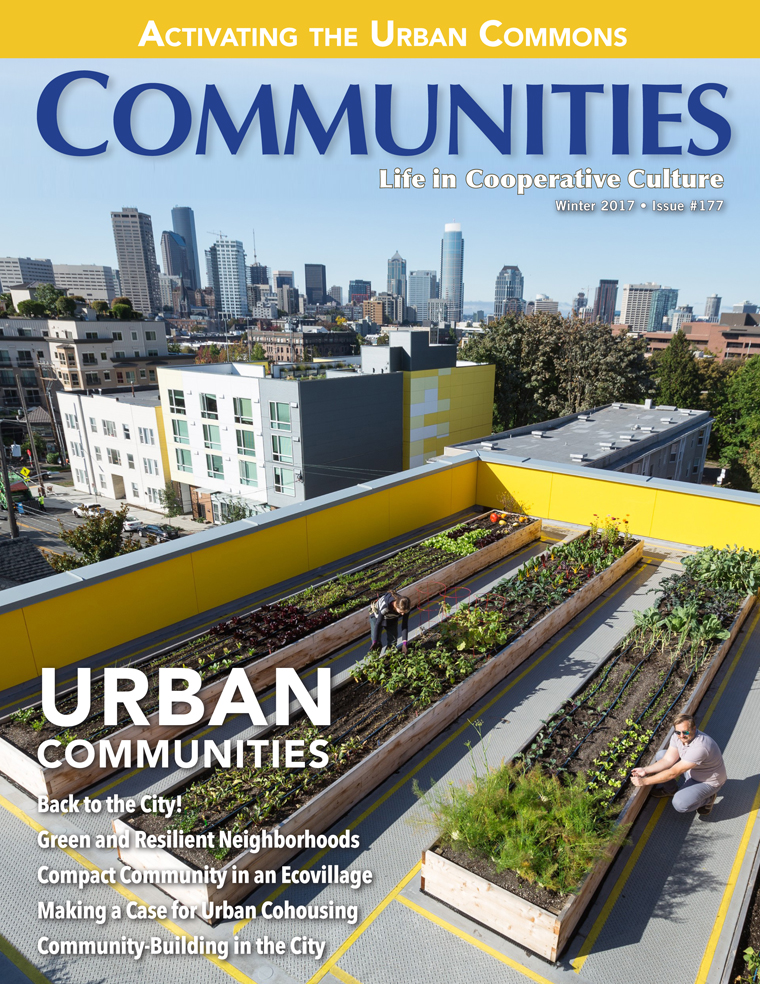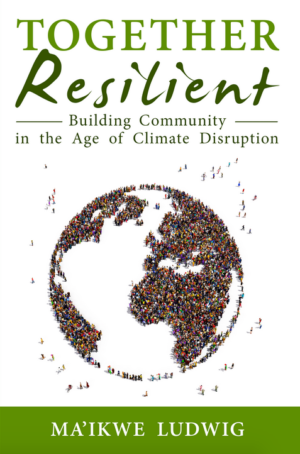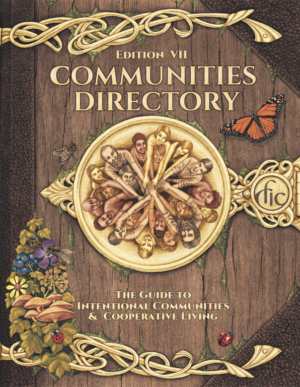Description
Urban Communities
Our Winter 2017 issue, Urban Communities, takes readers on a journey from the US East Coast through middle America to the West Coast, then to Canada and overseas. The communities featured span an equally broad range—from communes to cohousing, from outward-focused to more inward-focused, from retrofit to custom-built, from ecovillages, intentional neighborhood projects, and service-oriented groups to broader efforts to expand and strengthen the urban commons.
As our stories make clear, and despite popular preconceptions, in many ways no setting is better suited to intentional community than an urban one—and, even short of full intentional community, city-dwellers have many, ever-evolving options for creating more connection, mutual support, and sharing in their lives.
To purchase a print copy of this issue, contact Communities new home at GEN-US.
Articles in “Urban Communities”
- Notes from the Editor–Living for the City by Chris Roth
- Back to the City! by G Paul Blundell
As Compersia and Point A aim to demonstrate, a city can be the perfect place to start an egalitarian, income-sharing community. - Ganas: Finding Home in an Urban Community by Aviva Derenowski
A child of a kibbutz tries a rural community, but ultimately finds happiness in a multi-generational urban community. - DC Community Evolution and Change: Perspectives from Lutheran Volunteer Corps by Sarah Beck
While time has brought increased gentrification, a faith-based community’s fight for social justice in DC is far from over. - 1605 Commune, Washington DC by Bryan Allen Moore
Not started as an intentional community, a group gradually integrates intentional community concepts into how they live with each other. - Honoring the Conversation:Turning a Neighborhood into a Community in Intown Atlanta by Stephen Wing
Face-to-face conversation strengthens the sense of community among the diverse constituencies of a nonprofit Land Trust. - Enright Ridge Urban Ecovillage: A 13-Year-Old Retrofit Ecovillage in Cincinnati, Ohio by Jim Schenk
While it involves inevitable struggles, this replicable model both forms community and provides an ecological framework for living in the city. - The Radical Sabbatical: Discerning an Urban-to-Rural Move by Laura Lasuertmer
A family from the Bloomington Catholic Worker spends time at three Catholic Worker Farms, discovering an energizing vision. - Supported Growth by Amanda Crowell
In St. Louis, a community garden sprouts from the efforts of people passionate about growing not only food but community—and not afraid to ask for help. - The Dolphin House, Looking Forward by Brittny Love
A group of friends coalesces around a friend’s death and prepares for next steps in their community evolution, balancing urban and rural impulses. - Activating the Urban Commons by Neal Gorenflo
A new vision for cities puts people—not the market, technology, or government—at the center in addressing affordable housing, sustainable mobility, and other challenges. - Compact Community at Maitreya EcoVillage in Eugene, Oregon by Robert Bolman
Urban development needs sufficient density to support functional public transit, bicycling, and walking—while also staying beautiful, fun, green, and rich with community. - Green and Resilient Neighborhoods: Portland, Oregon and Beyond by Jan Spencer
Columbia Ecovillage, Cully Grove Garden Community, Kailash Ecovillage, River Road Neighborhood, and elsewhere embody diverse, promising approaches to re-greening our lives. - Making a Case for Urban Cohousing by Grace H. Kim
Urban cohousing offers a unique alternative that still allows access to the amenities, conveniences, and vibrancy of city life. - Community-Building in the City by Sheila Hoffman and Spencer Beard
In its formative and early stages, Capitol Hill Urban Cohousing in Seattle encounters both challenges and successes. - Terra Firma: A Single Mother Discovers Community by Shoshana Magnet
A small cohousing community in Ottawa provides an ideal mix of support and growth opportunities for a new parent and her son. - Urban Kibbutzim: A Growing Movement by Anton Marks
With rural kibbutz communities in retreat, newer, urban ones such as Kibbutz Mishol are providing examples of how society can be structured in a more just and equitable way. - Dreaming of a Shared City: Akko Educators’ Kibbutz by Gabriel Freund
A cooperative community of teachers and social activists works to empower its city’s residents to shape a more tolerant, peaceful, and vibrant future. - Review–Living Sustainably by Sarah M. Pike
- Review–Hippie Family Values by Chris Roth









